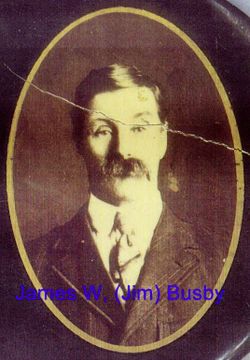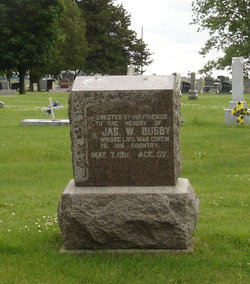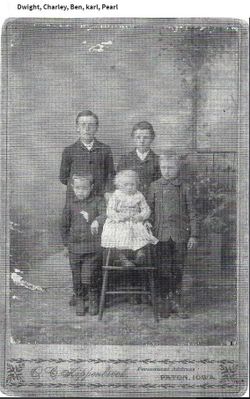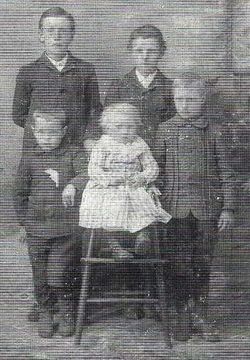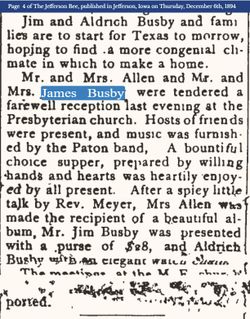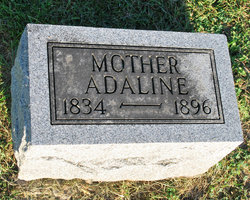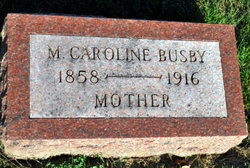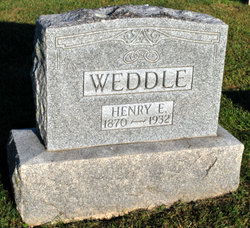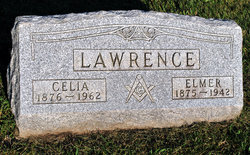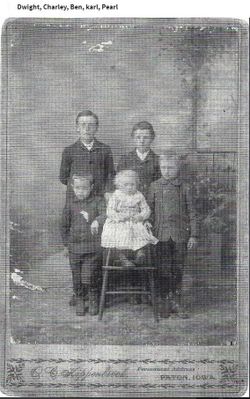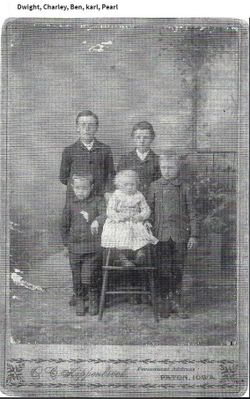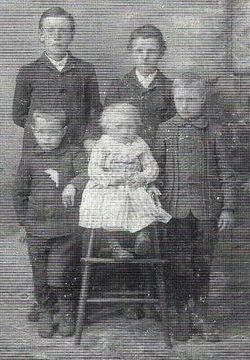| Description |
: |
Greene County Councilman 1889-1891
***************************************
United States, Officer Down Memorials, 1791-2014
Name: Town Marshal James W. Busby
Birth Year: abt 1858
Age: 53
Date of Incident: 7 May 1911
Death Location: Iowa
Department: Paton Marshal's Office
Department State: Iowa
End of Watch Date: 7 May 1911
Cause of Death: Gunfire
Weapon: Gun; Unknown type
Suspect: Shot and killed
Notes: Town Marshal, James Busby, was shot and killed as he attempted to apprehend two men who had blown the safe inside the Paton Post Office minutes earlier. Marshal Busby and several armed citizens chased the suspects into a nearby schoolhouse. As...
Read More
|
Greene County Councilman 1889-1891
***************************************
United States, Officer Down Memorials, 1791-2014
Name: Town Marshal James W. Busby
Birth Year: abt 1858
Age: 53
Date of Incident: 7 May 1911
Death Location: Iowa
Department: Paton Marshal's Office
Department State: Iowa
End of Watch Date: 7 May 1911
Cause of Death: Gunfire
Weapon: Gun; Unknown type
Suspect: Shot and killed
Notes: Town Marshal, James Busby, was shot and killed as he attempted to apprehend two men who had blown the safe inside the Paton Post Office minutes earlier. Marshal Busby and several armed citizens chased the suspects into a nearby schoolhouse. As they ran through the door, one of the suspects turned and shot Marshal Busby as he entered the door behind them. In a gun battle which followed, the citizens killed one suspect and severely wounded the other. The wounded suspect was charged with first degree murder. On November 4, 1911, he was found guilty of manslaughter after his attorney convinced the jury that his accomplice shot Marshal Busby.
Contributor: Hooked On Family (47448897)
Contributor: Susan Welch Jarnagin (48145228)
_____________________________________________________
From the JEFFERSON BEE, Jefferson, Iowa, Wednesday, May 10, 1911
ROBBERY AND MURDER AT PATON
Yeggmen shoot Down J. W. Busby
Stand Siege for Hours in the French SchoolHouse. One Bandit killed: One Captured fought to the Death when surrounded by Sheriff and Posse.
Two men dead and two wounded are net results of the most reckless and desperate encounter in the history of Greene County, which occurred last Sunday morning. The dead are: James W. Busby, a citizen of Paton, and Frank Galaise, robber and yeggman. The wounded are: Ed Pemble, citizen of Paton, shot through the leg and taken to hospital at Fort Dodge for treatment. Unknown robber, shot through left leg below knee and both bones shattered; captured and being treated in county jail here, and may lose leg.
The history of this desperate affray is equal in its dramatic character to the thrilling stories of the old wild western border. Shortly before four o'clock on Sunday morning Mr. J. O. Hoye, who runs a store next door north of the Paton Post Office, and lives up stairs, heard a noise somewhere below, which he took to be made by someone forcing the front door of his store. He had been conducting a special sale and had considerable money in the building, so he at once got up and investigated. He found that the noise proceeded from the Post Office, and upon looking out his own front door, he discovered a man walking up and down before the Post Office, armed with a revolver.
Having no weapons, Mr. Hoye retired and sought the telephone. He got in communication with E. O. Elmore, who lives over a store just across the street. Mr. Elmore could plainly see the robbers from his own front windows. They were at work upon the safe, which was situated near the front of the Post Office, which is located in Postmasters Latta's drug store. Mr. Elmore had three guns in his house, of various sorts, but there was no ammunition for any of them. He immediately called up Mr. Latta, by telephone, and a few moments later the explosion occurred which blew the door of the safe off its hinges, and tore its works all out, leaving the interior of the safe at the disposal of the robbers. The explosion was a loud one, and was heard and noted by many people who knew nothing of what was going on. The robbers hastily gathered the contents of the safe together, rifled the stamp and change drawer, and unlocking the back door escaped to the west.
In the meantime Mr. Latta was on his way, to the office, accompanied by a young man named Will Gordinier. They met the robbers about two blocks from the Post Office, and both parties stopped, Latta and Gordinier had no weapons, and the robbers, seeing this, started to run south, while Latta and Gordinier started around some buildings to head them off. Gordinier came up with them at the mouth of an alley, and the older robber said to the younger "Shoot him down." Gordinier turned and ran, and both the robbers fired, discharging eight or nine shots.
The robbers continued in a southerly direction through the town, and stopping at the Henry Wise barn, they got out a horse and harnessed it, tying it to the pump while they went to get out the buggy. In the meantime the town was being aroused, people were gathering, and seeing that they were in danger of being surrounded, the robbers abandoned the horse and started off on foot through the country to the south, following the bed of the creek that winds south from Paton.
It was now 4:30 o'clock and daylight, and the Paton people began to organize for a chase. Postmaster Latta, on reaching his office, immediately telephoned to Sheriff Wilson, who replied that he could be there as soon as an automobile could bring him. A party of a dozen men, among whom was J. W. Busby, went to Dana on the train and spread out to beat up the country and head the robbers off on the south; a number of parties started out of Paton in automobiles and on foot to follow the robbers from the north. The first auto, in charge of O. B. Stribling, was close upon them at the Frank Wise corner, one mile south of town, but missed them by turning east at this corner, while they turned west, still following the creek bed. No-body saw them during the pursuit, but their tracks through the meadows and soft ground were found and followed.
In the meantime the Paton party which had gone to Dana on the train was coming back northward and two of its members, Mr. Busby and V. C. Hinkle, reached the French school house, two and a half miles northwest of Dana and about the same distance southwest of Paton.
Mr. Busby and Mr. Hinkle went into the building, which was apparently empty. At the northwest corner of the building in the coalhouse, which is entered through a door leading from the school itself. Mr. Busby said; "I am going to look in the coal house." He walked to the door, and threw it partly open, and at the same instant there was a revolver shot from its interior and Mr. Busby fell to the floor. In falling he partly reclosed the door and Mr. Hinkle, who was armed with a shot gun, backed from the room and ran to the home of Morgan Johnson nearby, and gave the alarm. Mr. Hinkle says that Mr. Busby said nothing after he fell, but groaned once or twice. The heavy caliber bullet at point blank range, passed entirely through his body, entering at the left breast, and emerging at his back. His death was doubtless instantaneous.
The schoolhouse is located on an eminence in an open country, with no timber of consequence anywhere in the vicinity, and the robbers saw the hopelessness of attempting to leave it in the face of an aroused countryside and made no attempt in that direction, but prepared to stand a siege.
It was just before daybreak Sunday morning when Sheriff Wilson was apprised by telephone of the robbery. He hastily summoned Deputy Sheriff Tam Caufield and, arousing Frank Garland, had the latter get his automobile; and these, reinforced by marshal Beebe, started at once for the scene of the trouble. By that time it was broad daylight, and the car made rapid time to Paton where, after getting some of the details, the party doubled on the track back to the Henry Wise farm and there turned off toward the schoolhouse, reaching there only 15 or 20 minutes after the shot was fired that killed Mr. Busby.
Sheriff Wilson went within about 50 yards of the schoolhouse and called out to the robbers to surrender. The answer was a defiant shot from the robbers which, in turn, was answered by a volley from the posse, already augmented by new arrivals and now constantly increasing in numbers as the scattered band rallied to the sound of the fight. Sheriff Wilson fired the first shot of the attacking party and it was the signal for a fuselage, but after hearing the "ping" of the outlaw bullets, the front ranks of the besiegers fell back until they were 100 to 150 yards from the school house. From this safer siege the firing continued almost incessantly for about fifteen minutes, when one of the bandits appeared at a front door of the building and waving a broom in lieu of a flag of truce, called out for them not to shoot, as he wanted to surrender. Evidently he had been wounded soon after the attack began, for in the meantime he had improvised a tourniquet from a handkerchief and his revolver.
Sheriff Wilson called out to him to throw his gun away if he meant to surrender. This he did, first holding the weapon as high as he could and waving it to attract attention to the act. Then flinging it as far as he could, he substituted the broomstick for the revolver in the tourniquet and started to drag himself toward the posse. Wholly unable to walk and weak from loss of blood, he crawled, literally only one inch or two, with each effort for over an hour to reach the men who were at once his captors and his rescuers.
It was found that the weapon he brought out and threw away was that of Mr. Busby, his companion having taken his own away from him when he announced his determination to capitulate.
In the meantime there was no cessation of hostilities between the posse and the other bandit. By this time the posse was a small army and the building was surrounded on all sides. The armament of the posse included almost every variety of firearms - pistols, shotguns, Winchester rifles and revolvers of all calibers.
The window was broken out and the wall and doors of the structure were riddled with bullets until in places they resembled the lid of a pepperbox. For probably and hour after the wounded robber surrendered, the other continued shooting through the cracks in the wall of the coalhouse. Several times member of the posse thought they saw him at the schoolhouse windows, and some of them claim that once he appeared at the front door, though this cannot be verified. It was during this time that Mr. Pemble was shot and a number of the besiegers had narrow escapes. Many of the missiles passed so close to the Sheriff that he heard them "sing", and one of them grazed his cheek so closely as to burn a blister. Others of the posse also narrowly escaped the marksmanship of the desperate criminal. But eventually the shots from the robber's weapon creased.
The men of the posse could only conjecture whether he was "playing possum", whether he had used up all his ammunition, or whether he had been killed. But when repeated volleys drew no response, a number of the sheriff's party advanced to the front of the building, keeping up constant firing as they did, making it certain death to the bandit should he essay to face them. Opening the doors, and still shooting, they found the outlaw stretched upon the schoolhouse floor, stone dead. His head was to the south and his right hand, still clutching his revolver, lay on his breast. A ghastly wound was where his right eye had been and the drying blood upon it told them that he had been dead for some time.
Coroner Hamilton arrived on the scene a few minutes later. He at once impaneled a jury consisting of Messrs. Charles Field, L. S. Carl and Harry Phillips. Only a few witnesses were examined, the circumstances rendering an extended inquest unnecessary. The finds was as follows: "We the undersigned below do hereby find in our verdict of the cause of death in schoolhouse No.9, Paton Township, that said unknown man did come to his death while resisting arrest at the hands of the Sheriff of Greene County, and further that some member of the Sheriff's posse while they were in the pursuit of their duty; and further, we do not hold anyone of said members responsible for this man's death except himself."
Regardless of the finding of coroner's jury that the man was shot by some member of the sheriff's posse, many incline to the belief that he committed suicide, basting this theory largely upon the fact that his right eyebrow, immediately above the fatal wound, was noticeably singed, as by a weapon fired at close quarters. Dissenters from this theory, however, say that the ball having just passed through the door or wall of the building would have been exceedingly hot, sufficiently so to have burned the hair of the eyebrow, grazing it, as it did, on entering the flesh. They also point out that had the wound been self-inflicted the face would have been powder-burnt, which was not the case. The wound extended entirely through the man's head and the bullet, which presumably made it, was found under his head on the floor. One end of it is flattened mushroom fashion, but it is easily to be seen that it is of a larger caliber than 38, which was the size of the guns, both Colts, carried by the desperadoes.
For an inquest of the killing of Mr. Busby the coroner impaneled a jury consisting of Messers. William Legg, W. J. Walker and C. A. Johnson. In this case the following verdict was returned: "We, the jury called to sit upon the case of Mr. J. W. Busby, of Paton, Iowa, do, after listening to the facts related by various witnesses, return as our verdict that Mr. Busby's death was caused by a bullet which entered his breast and was fired by one of two men who were in schoolhouse No. 9. We do hold one of these two men as the cause; and as one is now dead we do hold the other man, now in the custody of the Sheriff of Greene County, responsible, until he is proven otherwise.'
After the surrender of the younger of the two bandits, he was given surgical treatment by Drs. Waddel, of Paton, and Kester, of Grand Junction. The left leg was pierced by a bullet also four inches below the knee. The missile had entered from behind and shattered both bones, and the limb was rendered useless. Evidently the fear of bleeding to death and the pain caused by the wound caused the crook to lose his neve and give up the fight. The nature of the wound renders it particularly liable to infection and the chances ahead of the wounded robber are anything but bright. The danger of blood poisoning will be present until the wound is thoroughly healed which, from appearances, will not be soon.
The captured bandit steadfastly refused to tell anything about either himself or his companion. The only clue to his identity afforded, however, was a good one, and one, which it is believed undoubtedly will lead to his identification. It was a photograph of a girl and upon it was written: "From your sister, Else" the girl or young woman looks to be a person of refinement. She was shown in three poses, the pictures being of this "folder style", doubled up to vest pocket size. The picture bore the imprint of the Meyers Photograph Company in Columbus, Ohio. Sheriff Wilson sent one of the pictures to Columbus and through it, the name and history of the young man will in all probability be brought to light.
On Monday Capt. Charles Jackson, of the Des Moines Police Department came up to see if he could identify either of the men. In the meantime, however, Sheriff Wilson received a booklet from the officials of the penitentiary at Stillwater, Minnesota that resulted in the positive identification of the dead man. It contains among other the picture of the man, a brief account of his criminal records and his measurements according to the Bertilion system. These latter were compared with the measurements of the body made by Capt. Jackson and tallied exactly. The marks upon the body, including scars on the neck and chin, were identical with those given in the description.
The man's name is given as Frank Gaislse, alias Herman DeMerse, alias Armand Dumers. He was sent to the Stillwater Penitentiary from Ramsey County, Minnesota, September 22, 1909, after conviction for grand larceny in the second degree and paroled October 6, 1910. He was wanted for violation of his parole. His age is given as 28 years, his descent as French and his occupation as a shoemaker and printer.
Although the captured desperado had steadfastly refused to talk of his identify or that of his partner in crime, he has unbosomed himself to the Sheriff as to their plans of getting away after robbing the safe. He states that they figured getting aboard the engine cab of the southbound passenger train and forcing the engineer, at the muzzle of their weapons, to run the train without a stop until many miles from the scene of the robbery. Then where the topography of the county offered chances for hiding they would have made him stop and let them off. The lateness of the closing of a barber shop in Paton kept them from getting to work until later than they had calculated, as they did not wish to begin operation until everybody in town was asleep. The train being late also interfered with their plans and the alarm spreading so rapidly cut off their retreat and forced them to make new plans. He says that when they went to the schoolhouse they hoped to conceal themselves in the garret, but this was found to be impossible, as there was no opening by which the garret could be entered.
He also says that his pal suggested going to the house near the schoolhouse (Morgan Johnson's), forcibly using a woman and a child as "shields" and covering their retreat in this way, presuming, of course, that this would keep the officers from shooting at them. He declares that he opposed this plan for fear the woman or child might be shot, but added that as things have turned out he wishes he had agreed to it adoption.
Post Office Inspector George S. Bassett, of Fort Dodge, who visited the scene of the robbery Monday, pronounced the work was that of an expert. Monday afternoon Sheriff Wilson arranged to have the surviving outlaw photographed by Mrs. Mason. The man objected as strenuously as his crippled condition remitted. He held his hands over his face and made a wry face, but his efforts to prevent being "mugged" were in vain, as a good negative was finally secured.
Sheriff Wilson speaks in the highest terms of the help extended by the volunteers who turned out from Paton and vicinity to help capture the criminals. Numerous individual instances of remarkable coolness and bravery came under his notice and he asks the BEE, to extend to these citizens the thanks of the authorities for their timely, loyal and determined support in the face of great danger.
The unfortunate fate of Mr. Busby has cast a deep gloom over the community in which he lived and, indeed, over the entire county, as he was well-known and universally liked.
He was prominent in the I.O.O.F. The funeral for Mr. Busby which will be held from the residence tomorrow afternoon, of that order. He leaves a widow and six children, all grown. Of the latter, there are five sons and one daughter; Dwight, Charles, Aldrich (Aldridge), Benjamin, Karl and Miss Pearl.
This morning the wounded prisoner was placed under the influence of as anesthetic and after the wound was thoroughly cleansed, the limb was placed in a plaster cast. Some small splinters of the shattered bone were removed during the operation which was performed by Drs. B. C. Hamilton and George Franklin. Sheriff Wilson took advantage to this opportunity to get some good photographs of the man.
While the unknown was being operated on Sheriff Wilson carefully examined his clothing and found in the collar of his coat, sewed into the padding, an eight-inch steel saw, or rather two saws, for the blade was broken into two pieces, either one or which would have enabled a prisoner to have sawed his way to liberty. This is another of the many proofs that the man is an expert "professional" crook.
_____________________________________________________
JEFFERSON BEE, Jefferson, Iowa Wednesday, May 17, 1911
FIRST DEGREE MURDER MAY MEAN A DEATH PENALTY
Wounded Bandit to County Jail Faces Possibility of the Law's Extreme Retribution
The Grand Jury had indicted the Paton robber, Frank Robinson, now wounded in the county jail, for the crime of murder in the first degree in connection with the killing James W. Busby. This crime may involve the death penalty if the charge can be sustained. Under a conviction it would be for the jury to decide whether the penalty inflicted should be death or life imprisonment.
The testimony of Mr. V. C. Hinkle, who was the only companion of Mr. Busby when he was killed, was particularly damaging to Robinson. Mr. Hinkle swore before the grand jury that when Mr. Busby opened the coal room door several shots were fired, and that he knew two persons were shooting because the shots came almost simultaneously. He further stated that after he had run out of the building and given the alarm, he hid nearby to watch the men and see that they did not escape while help was coming and that during this time they both came to the front door of the schoolhouse and looked out, but evidently concluded that escape was hopeless.
Sheriff Wilson is receiving interesting criminal commentaries from officers and others upon the man Galaise, who was killed, but nothing which he wishes to give out in public way, as the effort of the officers is now to learn something of the past record of Robinson. The Sheriff says that the long barreled Colt 38 which was used by the dead bandit is the finest revolver he had ever seen, and for effective shooting almost equal to a rifle. The deadly character of Galaise's marksmanship with this gun is shown by the fact that he kept the posse at a distance of at least 100 yards from the schoolhouse during the battle, and any attempt to get nearer drew such a desperate fire that the most venturesome were glad to back up.
Sheriff Wilson came very near getting killed when the wounded robber surrendered. He thought both men were giving up the fight, and walked out into the road in the direction of the schoolhouse. Several shots rang out and the bullets whizzed close by, one gazing his cheek and going halfway through a post right behind him. It was foolhardy to remain exposed to such a fire, and upon the Sheriff's advice, the posse all kept at long range, and the only one wounded was Mr. Pemble. When the dead robber was found he still had 100 rounds of ammunition is his pockets.
As to the present condition of Robinson, at the county jail, his wounded leg is progressing very favorably, but he is in bad shape mentally from brooding over his trouble. His heart has been giving trouble and Sheriff Wilson thinks his condition is rather serious. Last Saturday he received a call from two young women, one of whom was apparently his Des Moines sweetheart. It turned out later that these two young women were former Jefferson girls, daughters of Mr. and Mrs. Lincoln Huff. One of them is now Mrs. Nourse, formerly Thelma Huff. The other one, who was particularly interested in the prisoner, was a younger, unmarried sister. Efforts were made to glean from them something about the prisoner's record, but they apparently knew little about his previous history.
The following sketch of the life and account of the funeral of late J. W. Busby is clipped from the Paton Portrait:
"The regrettable feature of Sunday's tragedy was the giving of his life of one of our honored citizens, who, while performing his duty for his country, was shot and killed without a moment's warning. As the excitement of the community dies down, a pall of gloom fills the hearts of our people as they realize the terrible results following the visit to our community of those two desperate men.
"James W. Busby was born in Talladega. Alabama, April 10, 1858. Immediately after the close of the Civil War the family moved to Butlersville, Schuyler County, Illinois. At the age of 16 years he was engaged with farmer, John Rice, a former resident of Paton, on a farm near Frederick, Illinois. The following year in the spring of 1877, they came to Greene County, Iowa, driving through with a team, and located in the then sparsely-settled community, three miles from Paton on the Forbes farm, just one mile from the spot where 31 years later he was shot and killed in discharge of his duty.
In 1897 he was married to Miss Minerva Caroline Wilcox (half-sister of John and Edwin Rice), of Paton, where his continuous residence has been, since, except two short intervals in which he went south on account of the health of his family. Mr. Busby was a very enthusiastic and loyal member of the Odd Fellows and Masonic Order, having been a member of the former order since 1882, and retaining a continuous membership in the Paton Lodge for nearly 29 years. He had held many local offices during his residence here and led an honest, upright, moral life, and for many years as a member of the Presbyterian Church. He took an active part in the church work.
He is survived by his wife and sons: Dwight, Aldridge, Ben, Charles, and Karl E. and one daughter Pearl; and three brothers: Aldridge who lives here; one in Arkansas, and one in British Columbia.
The funeral service for Mr. Busby was held Thursday afternoon on the lawn in front of the home and was very largely attended. A large delegation of Odd Fellow was present from Jefferson, Churdan, Grand Junction, Dana and Gowrie. Reverends Kelley and Bowman conducted the religious services and Judge Z. A. Church those for the Odd Fellows and spoke eloquently on the death and character of his deceased brother. The Masonic Order conducted their services at the grave. |

